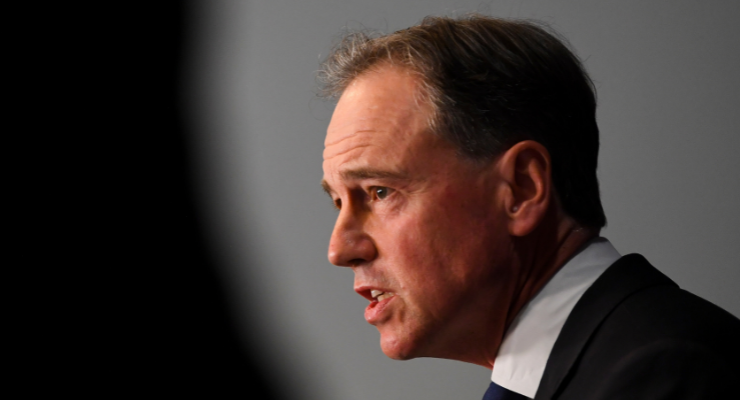
HUNT OUT?
Health Minister Greg Hunt is today expected to announce plans to quit politics at the next election, following the confirmation of backbencher Christian Porter’s departure yesterday via Facebook. Hunt was tight-lipped when the AFR asked him about his retirement yesterday, but “dear friend” Treasurer Josh Frydenberg has already paid tribute, saying Hunt had been an “outstanding health minister”, the SMH reports, citing our low COVID mortality and high jab rate.
It follows a 20-year career in federal Parliament — Hunt worked as a parliamentary secretary under former PM John Howard and handled science and industry portfolios under Malcolm Turnbull, as Guardian Australia reports. His seat of Flinders is relatively safe with a 5.6% margin. So what next for Hunt? The Sun-Herald reckons Hunt will replace George Brandis as High Commissioner in London — the role basically barracks for Australian interests (could be commercial, financial or just generalised) in the motherland.
Speaking of departures — SA Attorney-General Vickie Chapman has been suspended, the ABC reports, after an inquiry found she deliberately misled the house. Chapman was deputy premier of the state, and held the Planning portfolio — but resigned last week, The Islander reports, amid this logging drama on Kangaroo Island. Basically Chapman’s family has property there, and some claim that’s why she denied a $40 million timber development application nearby, as The Advertiser explains. Then in August, she was asked in parliament whether she, or her family, owned land in the area impacted by the proposed project, and she replied, “in short, no”. The inquiry disagreed.
[free_worm]
BRAKING BAD
A bill that could ban cyber hackers, kleptocrats, human rights violators, and corrupt officials from entering Australia is set to sail through the lower house today, ABC reports. That means people like the cronies of Russian President Vladimir Putin and Chinese officials who put Uyghurs into detention could face sanctions in Australia.
The laws were inspired by the United States’ Magnitsky Act — basically, people making loads of dosh from corrupt means get named and shamed on a sanction list. Once on there, banks refuse you any service, countries refuse you visas — and your family has similar issues, campaigner Bill Browder explained. Human rights barrister Geoffrey Robertston wrote for The Australian ($) earlier this year they’re a good tool for “ostracising bad people in other states who are complicit in killings and corruption, but who then want to enjoy the pleasures, and the banking facilities, of the West”.
The laws are named after Sergei Magnitsky, who in 2009 was arrested, tortured and killed in police custody in Russia after unearthing a huge tax fraud, The New Yorker explains. The US Act has been since copied by 33 countries, but Australia’s version of the law goes further, however, in that we’ll bar malicious hackers too, the SMH explains.
FIGHT OR FLIGHT
One in six Australian birds are now threatened, Guardian Australia reports, while nearly half of all kangaroo species are too, The Advocate adds. Charles Darwin University found the climate crisis is pushing more birdlife onto the list — 21 more were added in the last 10 years, like the fernwren, and the golden bowerbird. In NSW alone, eight birds became threatened after the tumultuous 2019-20 bushfires.
In the kangaroo family, the legal culling of the western grey and eastern grey kangaroos in Victoria is leaving the gene pool messed up — hunters usually target the larger males, biologist Nadine Richings explains, leaving the smaller males to do the breeding and the pack more vulnerable without their leader. Just a year on from the bushfires, The Advocate continues, the Victorian government has increased the culling quota by 65%.
In some good news, the bandicoot is back, baby. The furry marsupial has been brought back from the brink of extinction, the BBC says, after 30 years of conservation effort. Numbers of the eastern barred bandicoot have jumped from 150 to 1500 thanks to captive breeding programmes. Dismally, Australia has the worst mammal extinction rate of any country in the world, according to WWF Australia but threatened species biologist Amy Coetsee says with the support of government, community and volunteers, we can win the fight against extinction.
ON A LIGHTER NOTE
The first living robots can reproduce, and our days are numbered. Okay I exaggerated that last bit, but the xenobots really can have kids, CNN reports. Xenobots are teeny tiny blobs created from the stem cells of African clawed frogs, measuring less than a millimetre wide. When one thinks of robots, mechanics and metal might come to mind, but the University of Vermont’s Josh Bongard says what makes a robot is whether it acts on its own “on behalf of people”. The scientist, who heads up the project, says the xenobots are a robot-organism hybrid — a biotechnology — and their style of baby-making is very different to what we have seen before in any animal or plant.
They observed some xenobots gathering a bunch of cells in their mouth — a few days later, those cells became another xenobot. Researchers were “astounded” that the blobs figured out how to do that. But the xenobots are a long way off from world domination — their intelligence was compared to a 1940s computer, and they don’t have any practical uses yet. Scientists reckon one day they could collect microplastics in the ocean and inspect the root systems of flora. They might even help create regenerative medicine.
Hope life surprises you in some way today.
SAY WHAT?
After a long time giving everything I could to the people of Pearce it’s now time to give more of what is left to those around me whose love has been unconditional.
Christian Porter
The former attorney-general has bemoaned the “harshness” of politics in confirming he’ll resign at the next election. His margin has plunged in WA after he outed himself as the subject of a rape allegation, then sued ABC over it, then withdrew the case, then refused to reveal who donated to his legal fees. Porter denied the rape allegation, and a committee found that he didn’t break the rules in keeping donors anonymous, but it also concluded the rules needed to change, which would’ve been a blow for Porter.
CRIKEY RECAP
Anti-vaccine, anti-lockdown movement leaders seem to be getting sick…
“But whether they’ve contracted COVID, the common flu, or are just exhausted from weeks of non-stop protesting over a grab bag of misguided grievances, many of the top figures in the protest movements say they’re not feeling too good …
“Another prominent member of anti-vaccine and conspiracy circles, Matt Lawson, also complained on a livestream of feeling sick after attending the rallies. But it’s not COVID, he claims, but instead ‘the stuff they are spraying in the sky above Parliament’.”
The many things Scott Morrison could have done other than pat himself on the back
“It’s not the first time Morrison has used women’s experiences to push his agenda. He gave himself the opening address at the Women’s Safety Summit. He highlighted the vitriolic abuse women and young people experience online to promote his anti-trolling bill (despite advocacy organisations saying defamation proceedings is not something cyber abuse victims seek).
“And he consistently wheels out his recently promoted cabinet women. Morrison would also like the public to believe fixing Parliament culture is not only his responsibility, just as it is not his fault, mentioning the government’s response would have to be a ‘multi-party’ approach 10 times in the 45-minute press conference.”
Let’s call the ‘toxic culture’ at Parliament House what it is: a criminal conspiracy
“What’s revealed in the report is as much about a criminal conspiracy as it is about a toxic workplace — a conspiracy to cover up, indeed, to normalise, sexual assault, sexual predation, harassment and bullying. It contains a litany of shocking incidents — accompanied by attempts to downplay or hide them, protect the perpetrators and punish the victims.
“The first level of the conspiracy is failing to act against well-known perpetrators. The report described a culture in which the individuals responsible for misconduct are often widely known and their behaviour deliberately overlooked, minimised or tolerated.”
READ ALL ABOUT IT
Russia orders US diplomats to leave as Ukraine tensions escalate (Al Jazeera)
15-year-old is in custody after Michigan school shooting kills 3 (The New York Times)
Alice Sebold apologizes to exonerated man who spent years in prison for her rape (CNN)
EU must consider mandatory COVID jabs, says [EU President] Von der Leyen (The Guardian)
All of southwest [British Columbia] under flood watch as 3rd consecutive storm rolls through (CBC)
Dozens, including many children, die in Nigeria boat disaster (Al Jazeera)
‘A win for reproductive choice’: Northern Territory abortion law overhauled (SBS)
Why only 36% of South African adults are vaccinated (The New York Times)
CNN suspends Chris Cuomo indefinitely (CNN)
Fiji welcomes back Aussie tourists with big, bright Bula greeting after two years of COVID-19 (The Australian) ($)
THE COMMENTARIAT
Bullies rely on power to protect them, not online anonymity — Yassmin Abdel-Magied (Guardian Australia): “I’ve had more death threats than flat whites. I’ve spent years opening my inbox to emails from strangers detailing their graphic fantasies of my execution (after I have been raped and flogged, of course). I’ve listened to pundits casually chatting about murdering me on national radio, politicians suggest I support dictatorships, seen over 200,000 words written about me in the press, all amounting to a ‘full-scale assault on [my] existence’.
“The government’s proposed legislation, forcing social media companies to reveal the identities of anonymous accounts, is less about protecting the average citizen and more about the government’s singular obsession with control and power. Anonymity is not what protects bullies. Power is. Morrison has framed the bill as a pathway for individuals to sue anyone online for defamation. Let us ask ourselves: who has enough money to sue anonymous users of the internet?”
What will the world be like in 20 years? — Andrew Ross Sorkin (The Age): “About 70% of the world population is expected to live in urban areas by 2050, according to data from the United Nations. That means most cities are going to need more infrastructure. Roads, public transportation and waste management will need massive expansion and upgrades. The average person produces 4.9 pounds of waste a day, up from 3.66 pounds in 1980 …
“We’re also going to need a lot more energy. The US Energy Information Administration projects that the world will need about 28% more energy in 2040 than it did in 2015 based on the number of people in the country and consumption patterns; on our current trajectory, about 42% of electricity in the United States will come from renewable sources … Technology has led us to expect that goods and services will be delivered at the push of a button, often within minutes. That could transform real estate, especially space in cities that is currently used for retail.”
HOLD THE FRONT PAGE

WHAT’S ON TODAY
Australia
-
Defence Minister Peter Dutton will speak at a Lowy Institute conference about the Indo-Pacific, held online.
-
ViiV Healthcare Australia and the National Association of People with HIV Australia will host a live panel discussion about how we can improve the lives of people with HIV. Catch this one online.
-
Own it!’s Crystal Mahey-Morgan, Magabala Books’ Rachel Bin Salleh, Aitken Alexander Associates’ Emma Paterson, and Left Bank Literary’s Grace Heifetz will discuss representation, voice and agency. Catch this one online.











Crikey is committed to hosting lively discussions. Help us keep the conversation useful, interesting and welcoming. We aim to publish comments quickly in the interest of promoting robust conversation, but we’re a small team and we deploy filters to protect against legal risk. Occasionally your comment may be held up while we review, but we’re working as fast as we can to keep the conversation rolling.
The Crikey comment section is members-only content. Please subscribe to leave a comment.
The Crikey comment section is members-only content. Please login to leave a comment.